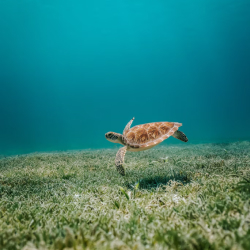New Pacific Marine Reserve

A large marine reserve is going to be created as part of an agreement between Columbia, Costa Rica, Ecuador and Panama. The reserve will span the coasts of all four countries.
Important Migratory Waters
The new reserve is to be called the Eastern Tropical Pacific Marine Corridor (CMAR). In total the area will span 200,000 square miles of the Pacific Ocean. It is significant as the area is part of important long distance migratory routes for many large sea creatures. Sharks, whales, stingrays, turtles and whales make annual migrations to move between feeding grounds or to breed.
The announcement for the new reserve was made during the COP26 Environment summit in Glasgow last month. Leaders from each country were there to make the announcement. The reserve means that there will be a ban on commercial fishing within the area, as well as stopping illegal small scale fishing by local communities.
Protection for Galapagos
In addition to the new reserve, the presidents of Ecuador and Columbia also announced that they are to expand their already protected waters around their countries. This will also include the seas around the Galapagos Islands which provides a marine habitat for hundreds of species uniquely found within those waters.
Many critics called for more action around the COP26 summit and less talk. The leaders of Ecuador, Columbia, Costa Rica, and Panama have risen to that challenge. However, there is a lot of work to be done to set up the reserve and police it.
Environmentalists applaud move
Environmentalists have applauded the move as the numbers of fish in the region were rapidly falling. Migratory fish such as sharks and stingrays are targeted by fishing fleets from multiple different countries. The eastern Pacific is historically a rich area for marine life, but numbers of certain species are falling. Hammerhead sharks are in notable danger because of their fins being prized highly within Chinese food and medicine. There are already fishing laws in place within each of the countries closest to the Pacific fishing grounds, but the rules are broken. Last year one Ecuadorian company illegally exported 26 tonnes of shark fins to Hong Kong.
The announcement of the CMAR reserve is critical, but now that the intentions are in place the countries must deliver on their commitment, and crucially they must enforce the fishing laws.



